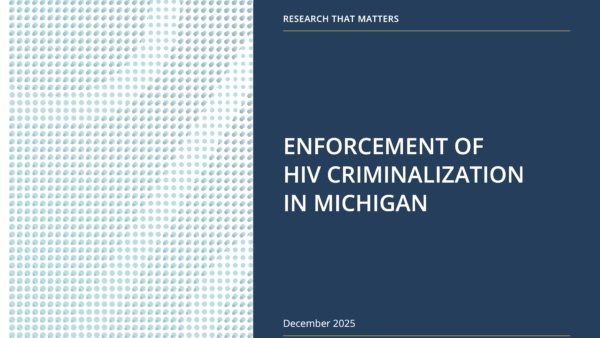
Proposal to remove the crime of “danger of contagion” from the Federal Penal Code
Translated from Spanish with Deepl.com. Scroll down for original article.
In order not to undermine human rights and avoid the discrimination faced by people living with HIV (Human Immunodeficiency Virus) and AIDS (Acquired Immune Deficiency Syndrome), Congresswoman Laura Hernández García (MC) proposed repealing article 199 bis of the Federal Criminal Code, which refers to the crime of ‘danger of contagion’.
The article to be repealed establishes that anyone who, knowing that he or she is ill with a venereal disease or other serious disease during an infectious period, endangers the health of another by sexual intercourse or any other transmissible means, will be punished with three days to three years in prison and up to forty days in fines.
In addition, if the disease is incurable, it will be punishable by six months to five years in prison, and in the case of spouses, concubines or common-law wives, it will only be possible to proceed by complaint of the offended party.
The initiative, sent to the Justice Commission, considers that this decriminalisation contributes to eliminating barriers that limit the prevention and timely detection of the virus. It also strengthens public policy measures that contribute to combating the HIV pandemic within the framework of public health.
It states that HIV is a public health and human rights problem that, as of 2023, affects 39.9 million people around the world, who, due to stigma and discrimination, see their human rights violated and face barriers to exercising their rights and accessing health services that allow them adequate treatment.
These barriers, it stressed, signify institutional violence, which is why it is necessary to repeal article 199 Bis of the Federal Criminal Code, as the crime of danger of contagion ‘cannot remain in force’.
It called for building a new perspective on HIV, AIDS and people living with the condition, with a culture based on information that promotes non-discrimination, equal treatment, prevention and testing.
It explains that of the 33 penal codes that operate in Mexico, 27 provide for the crime of danger of contagion, which is often used against people with HIV, so this proposal is a first step to repeal it in the states where it still exists.
It points out that punitivism and criminalisation have different consequences for people living with HIV, such as loss of employment or housing, being forced to live in isolation from their families and society, as well as being subjected to physical violence.
It places HIV-positive people – especially women – at greater risk of violence and abuse, and ignores the reality that some may lack the capacity to disclose their HIV status or may not be able to negotiate condom use with their partner.
It adds that such criminalisation restricts the institutional public health response to HIV, as it results in fewer people attending health services for testing to avoid being exposed, diagnosed or punished, which does not help them, if necessary, to start treatment or share their diagnosis.
The disease affects not only those living with the virus, but also their families and those in their social environment. This is why there must be no criminal offence that violates their human rights and their access to health services.
The perspective of the response to the virus must focus on public health, not punitivism, the proposal emphasises.
Con el propósito de no socavar los derechos humanos y evitar la discriminación que enfrentan las personas que viven con VIH (Virus de Inmunodeficiencia Humana) y Sida (Síndrome de Inmunodeficiencia Adquirida), la diputada Laura Hernández García (MC) planteó derogar el artículo 199 bis del Código Penal Federal, que se refiere al delito de “peligro de contagio”.
El artículo que se pretende derogar establece que el que a sabiendas de que está enfermo de un mal venéreo u otra enfermedad grave en período infectante, ponga en peligro de contagio la salud de otro, por relaciones sexuales u otro medio transmisible, será sancionado de tres días a tres años de prisión y hasta cuarenta días de multa.
Además, si la enfermedad fuera incurable será de seis meses a cinco años de prisión, y cuando se trate de cónyuges, concubinarios o concubinas, sólo podrá procederse por querella del ofendido.
La iniciativa, enviada a la Comisión de Justicia, considera que esta descriminalización contribuye a eliminar barreras que limitan la prevención y detección oportuna del virus. Además, fortalece las medidas de política pública que abonan al combate de la pandemia del VIH en el marco de la salud pública.
Expresa que el VIH constituye un problema de salud pública y de derechos humanos que, a 2023, afectaba a 39.9 millones de personas alrededor del mundo, y quienes, debido al estigma y discriminación, ven violentados sus derechos humanos y enfrentan barreras para ejercer sus derechos y acceder a servicios de salud que les permitan un tratamiento adecuado.
Esas barreras, destaca, significan violencia institucional, por lo que es necesario derogar el artículo 199 Bis del Código Penal Federal, pues el delito por peligro de contagio “no puede seguir vigente”.
Se pronunció por construir una nueva perspectiva en torno al VIH, el Sida y las personas que viven con esta condición, con una cultura basada en la información que fomente la no discriminación, el trato igualitario, la prevención y la realización de pruebas.
Explica que de los 33 códigos penales que operan en México, 27 prevén el delito de peligro de contagio, que suele usarse contra personas con VIH, por lo que esta propuesta es un primer paso para que se derogue en los estados donde aún existe.
Refiere que el punitivismo y la criminalización tienen diferentes consecuencias para las personas que viven con VIH, como la pérdida del empleo o la vivienda, que se les orille a vivir aisladas de sus familias y de la sociedad, así como ser objeto de violencia física.
Coloca a las personas seropositivas –en especial a las mujeres– en una situación de mayor riesgo de violencia y abusos, e ignora la realidad de que es posible que algunas carezcan de la capacidad para revelar su estado serológico o no están en condiciones de negociar con su pareja el uso de preservativo.
Agrega que esa criminalización restringe la respuesta institucional al VIH en materia de salud pública, pues provoca que menos personas acudan a servicios de salud a realizarse pruebas de detección para evitar ser visibilizadas, diagnosticadas o castigadas, lo cual no ayuda a que, en caso necesario, inicien el tratamiento o compartan su diagnóstico.
La enfermedad no sólo afecta a quien vive con el virus; también a sus familias y a quienes forman parte de su entorno social. Por eso es necesario que no exista ninguna figura penal que vulnere sus derechos humanos y su acceso a servicios de salud.
La perspectiva de la respuesta al virus debe enfocarse en la salud pública, no en el punitivismo, enfatiza.









